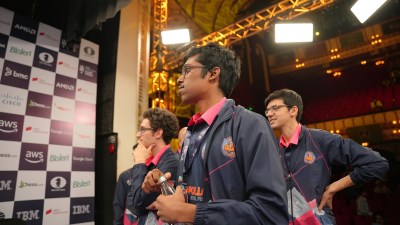Click here to join Express Pune WhatsApp channel and get a curated list of our stories
Science is not a collection of anecdotes, we believe in randomised controlled trials: Harvard prof Kasisomayajula Viswanath
Dr Kasisomayajula Viswanath spoke at the India Science Festival on Pune’s Fergusson College grounds.
 Prof Kasisomayajula Viswanath at the India Science Festival 2025. (Express Photo)
Prof Kasisomayajula Viswanath at the India Science Festival 2025. (Express Photo)Health is like wealth; it is unequally distributed, said Dr Kasisomayajula Viswanath, a professor of health communication at Harvard University’s T.H. Chan School of Public Health, at the India Science Festival on Pune’s Fergusson College grounds.
“Similarly, communication is also unequally distributed. Even though we think it is easily available, it is not. There are inequalities in communication access and resources among different groups of people,” said Viswanath while speaking at a session titled Truth and Evidence: Public Communication & Science in the Era of Misinformation.
In an interview with The Indian Express after the session, Viswanath discussed the challenges of science communication in India, Meta’s announcement to stop its fact-checking programme in the US, and science misinformation online.
Q: What do you think is the biggest challenge in science communication in India?
Dr Kasisomayajula Viswanath: One challenge in India is heterogeneity, whether it is class, religion, or language. Whatever you want to do, you have to pay attention to the scale. Scale is a huge challenge in India because of the diversity. Don’t get me wrong; diversity is a good thing. But when you are communicating scientific facts, it is a real challenge.
On the other hand, the Indian government has worked out a system on how to address heterogeneity, but it takes more effort.
Q: What effect do you think Meta stopping its fact-checking programme will have on social media misinformation?
Dr Kasisomayajula Viswanath: It won’t help. Meta is focusing on political misinformation, but there is certainly a line that blurs between political misinformation and scientific misinformation. Fact-checking is not perfect, but it is effective up to a point. They are not just eliminating fact-checking but also removing de-ranking, demoting and other policies.
Q: They are transitioning to community note-based fact-checking. What do you think about its effectiveness?
Dr Kasisomayajula Viswanath: Yes, they are transitioning to a community note-based fact-checking system, but I’m not sure how effective it will be. Can anyone say that Twitter or X is a better platform these days? No. Wikipedia works on a community-based method, but I’m uncertain about Meta.
I can understand why they want to do it, particularly in a critical context where there is a danger of censorship. In politics we want a multiplicity of points of view, but in science, there is a consensus or there is no consensus. It is much more black and white. Whether I believe in evolution or not doesn’t matter. That is what I’m worried about.
Q: On the popular Joe Rogan podcast, a guest claimed that people he knew beat stage 4 cancer using ivermectin and fenbendazole. What are your thoughts?
Dr Kasisomayajula Viswanath: You see it all the time; people have alternative medicine approaches. But these are anecdotes, and science is not a collection of anecdotes. We believe in randomised controlled trials and compile evidence over time, so it is not that easy.
If somebody says, ‘I believe in this; my aunt got saved because of this,’ you don’t want to dismiss that because it might be disrespectful. But the fact is that it is not true.
Q: In India, various podcasters or content creators passionately argue for things that lack scientific evidence, like semen retention. How can this be countered?
Dr Kasisomayajula Viswanath: Increase the supply of more accurate information. The good news is that not everyone is exposed to misinformation. Maybe a thousand people are, but we are 1.4 billion people. The solution is to ensure that people have access to accurate scientific information. I think that is the only way to address this.
Click here to join Express Pune WhatsApp channel and get a curated list of our stories








